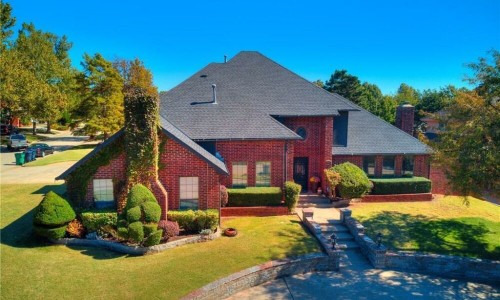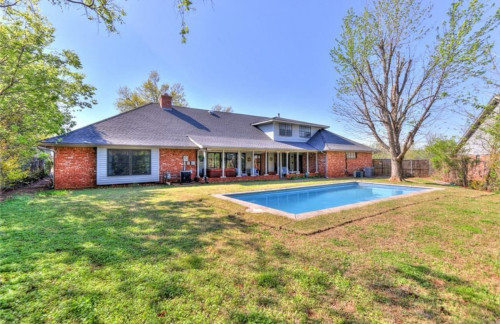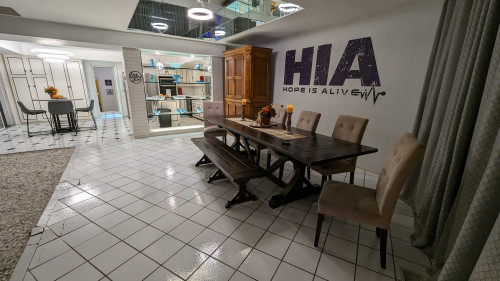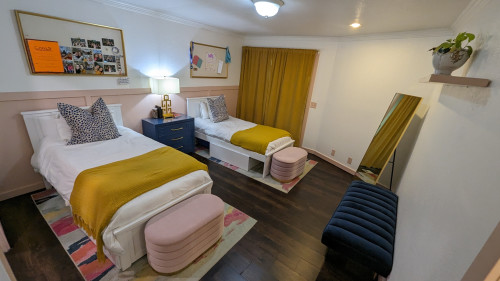






Hope is Alive Recovery Homes - Oklahoma
Treatment Focus
This center primarily treats substance use disorders, helping you stabilize, create relapse-prevention plans, and connect to compassionate support.
Primary Level of Care
Transitional housing designed to support individuals recovering from substance use disorders offering a safe, supportive and structured environment for practicing long-term sobriety, while reintegrating back into daily living.
Claimed
Recovery.com has connected directly with this treatment provider to validate the information in their profile.
Treatment Focus
This center primarily treats substance use disorders, helping you stabilize, create relapse-prevention plans, and connect to compassionate support.
Primary Level of Care
Transitional housing designed to support individuals recovering from substance use disorders offering a safe, supportive and structured environment for practicing long-term sobriety, while reintegrating back into daily living.
Private Pay
You pay directly for treatment out of pocket. This approach can offer enhanced privacy and flexibility, without involving insurance. Exact costs vary based on program and length of stay. Contact the center for specific details.
Hope is Alive Recovery Homes - Oklahoma
Hope is Alive Recovery Homes - Oklahoma
About Hope is Alive Recovery Homes - Oklahoma
Hope is Alive (HIA) Ministries provides a Christ-centered approach to substance use treatment. The ministry began with founder Lance Lang's recovery from addiction and his wife and co-founder Ally's experience supporting him during recovery. HIA believes that addiction is a disease, there is power in prayer and community, recovery is possible for the whole family, it's important to replace negative behaviors with healthy behaviors, feeling is part of healing, and that there is hope. In Oklahoma, they offer separate homes in Oklahoma City and Tulsa for men and women, while their homes in Claremore and Weatherford are for men only.
Find Hope Through Sober Living
HIA's sober living program focuses on healing core wounds that led to alcohol and drug use, facilitating "radical life change." Their gender-specific houses have mostly shared bedrooms, new bedding, dressers, nightstands, lamps, and personal kitchen space. They recommend bringing a Bible, food and non-alcoholic drinks, clothes hangers, laundry detergent, towels and other personal bathroom supplies, and a month's worth of clothing.
Along with a place to stay, HIA provides an active schedule. Participants are expected to enroll in a local 12-Step facilitation program, find full-time employment nearby, and participate in optional adventure outings like ski trips and retreats. Residents attend monthly in-house mentor meetings, a local church, a Sunday evening house meeting, a Monday night Bible study, and a Wednesday group meeting. The meetings are at 6:30 p.m. local time. They customize the curriculum to meet residents' needs, and can help with legal issues as necessary. In addition, residents can serve the community once a month. The program lasts 12-18 months with most residents staying the full 18 months. The program charges $750 for the first month and $650 for every following month. To ensure sobriety, Hope is Alive performs random drug tests.
Additional Programs
Hope is Alive is based in Oklahoma City but has a national reach through their sober living and family therapy programs, as well as their retreats, YouVersion Bible reading plan, and church, corporate, and school partnerships. They feature Craig Groeschel's endorsement on their YouTube, and they've worked with Groeschel, Tim Tebow, Brandon Lake, and Ben Fuller on their retreat programs. They provide information about their regular and special programming through their printed RADICAL magazine and blog posts.
Hope is Alive offers free family care through their Finding Hope program, where they commit to intentionally loving, supporting, and praying for each other. They hold meetings twice a month for 60-90 minutes. Their Hope After Loss counseling program helps people who have lost a loved one to addiction.

Center Overview
Treatment Focus
This center primarily treats substance use disorders, helping you stabilize, create relapse-prevention plans, and connect to compassionate support.

Pricing and Program Length
Estimated Center Costs
The cost listed here ($750 for the first month and $650 for every following month), is an estimate of program cost. Center price can vary based on program and length of stay. Contact the center for more information. Recovery.com strives for price transparency so you can make an informed decision.
Levels of Care





Your Care Options
Specializations
Christian
Through surrender and commitment to Christ, patients refocus the efforts and source of their recovery with clinical and spiritual care.
Retreat
These curated experiences promote physical, mental, and spiritual well-being, and provide a break from the busy pace of daily life.
Who We Treat
Approaches
Family Involvement
Providers involve family in the treatment of their loved one through family therapy, visits, or both–because addiction is a family disease.
Individual Treatment
Individual care meets the needs of each patient, using personalized treatment to provide them the most relevant care and greatest chance of success.
Christian
Through surrender and commitment to Christ, patients refocus the efforts and source of their recovery with clinical and spiritual care.
Gender-Specific
Separate treatment for men or women can create strong peer connections and remove barriers related to trauma, shame, and gender-specific nuances.
Therapies
1-on-1 Counseling
Patient and therapist meet 1-on-1 to work through difficult emotions and behavioral challenges in a personal, private setting.
Family Therapy
Family therapy addresses group dynamics within a family system, with a focus on improving communication and interrupting unhealthy relationship patterns.
Spiritual Care
Tending to spiritual health helps treatment become more effective, allowing patients to better cope with their emotions and rebuild their spiritual wellbeing.
Substances We Treat
Alcohol
Using alcohol as a coping mechanism, or drinking excessively throughout the week, signals an alcohol use disorder.
Cocaine
Cocaine is a stimulant with euphoric effects. Agitation, muscle ticks, psychosis, and heart issues are common symptoms of cocaine abuse.
Drug Addiction
Drug addiction is the excessive and repetitive use of substances, despite harmful consequences to a person's life, health, and relationships.
Ecstasy
Ecstasy is a stimulant that causes intense euphoria and heightened awareness. Abuse of this drug can trigger depression, insomnia, and memory problems.
Heroin
Heroin is a highly addictive and illegal opioid. It can cause insomnia, collapsed veins, heart issues, and additional mental health issues.
Psychedelics
Hallucinogenic drugs—like LSD—cause euphoria and increased sensory experiences. When abused, they can lead to depression and psychosis.
Methamphetamine
Methamphetamine, or meth, increases energy, agitation, and paranoia. Long-term use can result in severe physical and mental health issues.
Opioids
Opioids produce pain-relief and euphoria, which can lead to addiction. This class of drugs includes prescribed medication and the illegal drug heroin.
Synthetic Drugs
Synthetic drugs are made in a lab, unlike plant-based drugs like mushrooms. Most synthetic drugs are either stimulants or synthetic cannabinoids.
Languages
Aftercare
Care Designed for Your Needs
Personal Amenities
Special Considerations
Gender-specific groups
Patients in gender-specific groups gain the opportunity to discuss challenges unique to their gender in a comfortable, safe setting conducive to healing.
Religion-Based Track
Patients can join faith-based recovery tracks to approach recovery with others in their faith, healing in a like-minded group with similar goals.
Off-Site Activities






